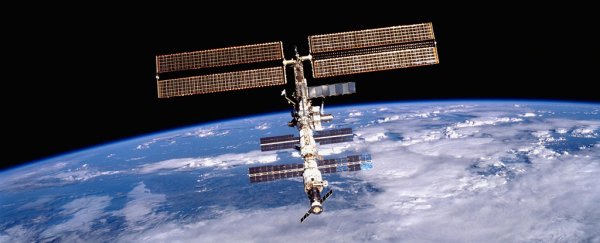Certain types of bacteria can mutate to reproduce more quickly when exposed to microgravity, and that's not great news for our space tourist dreams, seeing as we humans are teeming with bacteria.
It's not clear why these bacteria have responded so positively to microgravity, but researchers are now figuring out ways to protect astronauts out in space, as well as mitigating the damage should a space-modified colony ever find its way back to Earth.
Researchers from the University of Houston monitored Escherichia coli cells through 1,000 generations of growth in simulated microgravity conditions, finding that it spread significantly faster than a control sample of unaltered bacteria.
The E. coli cells also picked up at least 16 different genetic mutations along the way, though it's not known yet how these mutations affect growth rates, either individually or as a group.
"This study is broader in scope than previous ones on two counts," one of the team, Jason Rosenzweig, told Leah Crane at New Scientist.
"It's looking at a much longer trajectory and it's also interrogating the entire genome rather than specific subsets of genes."
The adapted cells grew about three times as many colonies as the unmodified E. coli, the tests showed.
Even when the supercharged bacteria were removed from microgravity conditions up to 30 generations before testing, 72 percent of the growth advantage was retained, showing that some changes prompted by space travel could be permanent.
"We are, in fact, seeing true genomic changes – permanent changes," one of the researchers, George Fox from the University of Houston, told New Scientist. "Next we need to figure out exactly what those changes are doing."
While previous studies haven't gone to this level of depth or lasted for this long, scientists have previously seen signs of that bacteria can reproduce more readily in space.
Certain strains have previously been shown to grow 60 percent more quickly in microgravity, so there seems to be something about that weightless environment that these microorganisms really like.
Even now, astronauts on board the ISS are having to deal with thick biofilms of bacteria on their equipment that are growing faster than normal, which sounds like the start of a some kind of space horror movie.
The team says further study will help us figure out what kind of bugs could be hitching a ride on our spaceships, and how they might grow and adapt.
And if any modified bacteria should make it back down to Earth – perhaps on board a spaceship of tourists – we also need to know what we're dealing with.
In this case, the team reported that the mutated bacteria was killed off just as quickly as normal E. coli when treated with antibiotics, so the good news is the supercharged bacteria invasion is on hold for the time being.
Now the researchers want to see further experiments both out in space and in simulated microgravity conditions so we can figure out how bacteria can pick up a reproductive advantage in these conditions.
"We need more of this kind of experiment, especially with human space flight gaining more traction in recent years," lead researcher, Madhan Tirumalai, told New Scientist.
The research has been published in NPJ Microgravity.
